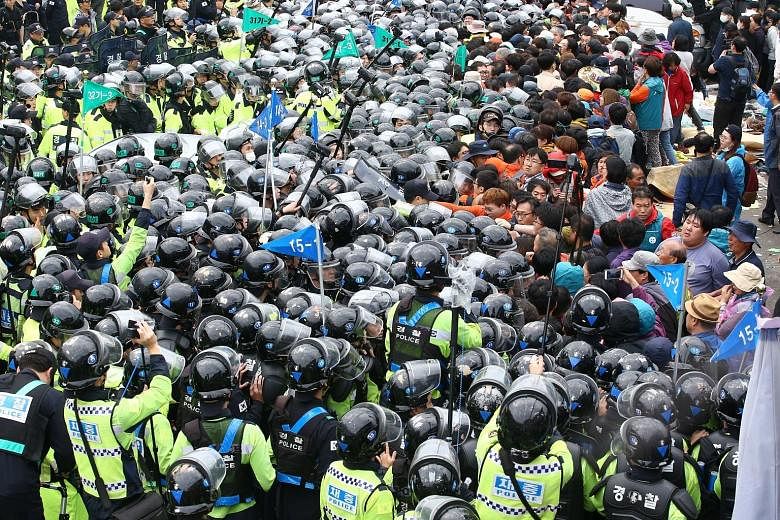South Korean President Moon Jae In stressed that diplomacy, not war, was the way to deal with the North Korean nuclear threat, even as the South yesterday completed the deployment of a missile shield.
He voiced hopes of a peaceful resolution using increased pressure and sanctions at a forum in Vladivostok, Russia, alongside Russian President Vladimir Putin and Japanese Prime Minister Shinzo Abe.
"I can say for sure that there will be no war on the Korean Peninsula again," Mr Moon said at a question-and-answer session, reiterating his earlier pledge not to allow South Korean ally US to launch an attack on the North.
Mr Abe called North Korea a grave threat and said it must be made to abandon its nuclear and missile programme, but Mr Putin argued sanctions alone will not work. "It is impossible to scare them... They think that means the next step for them is an invitation to the cemetery," he said.
The meeting came as the US and other states push for stronger United Nations sanctions against North Korea, which launched two intercontinental ballistic missiles (ICBM) in July and conducted its sixth nuclear test on Sunday.
The threat from the North led South Korea to "tentatively" allow the installation of the four remaining launchers of the Terminal High Altitude Area Defence (Thaad) system yesterday in Seongju county, 300km from Seoul, despite protests.
The Defence Ministry said yesterday Thaad will be operational once the US completes "internal procedures", but whether the deployment will be permanent rests on an ongoing environmental impact review and consultations with "relevant" neighbouring countries.
China and Russia oppose the installation. Likewise, many local residents who fear possible health and environmental problems.
Hundreds of protesters tried to block trucks carrying the Thaad launchers yesterday, clashing with an 8,000-strong police convoy. Dozens were hurt and taken to hospitals, said the Yonhap news agency.
Trying to assuage public concern, Prime Minister Lee Nak Yon said in a government meeting yesterday that the Thaad deployment is a "difficult yet inevitable decision" to safeguard national security in view of North Korea's increasingly sophisticated missile and nuclear programme.
Several analysts warned that the deployment could give China a reason not to support new UN sanctions, which may include cutting off North Korea's oil supply, most of which comes from China. Beijing has lodged a "stern" diplomatic protest with South Korea and demanded Thaad be withdrawn. Chinese Foreign Ministry spokesman Geng Shuang yesterday urged South Korea and the United States to seriously consider the interests and security concerns of China and others.
Dr Lee Seong Hyon of the Sejong Institute think-tank said China does not believe sanctions can solve the North Korean problem, but "feels compelled to show the image (of itself) as a responsible power".
He added: "China wants to project the appearance that the Thaad issue doesn't affect its decision at the UN... But in reality, the two are related."

